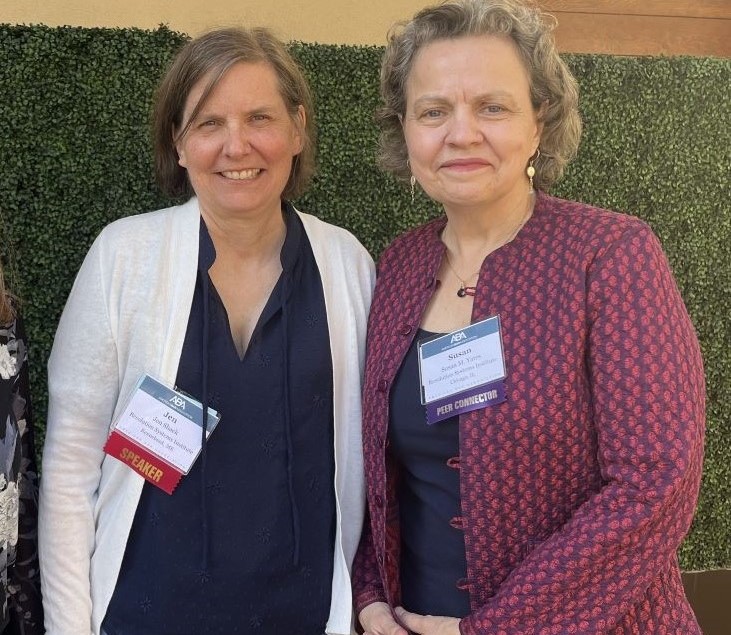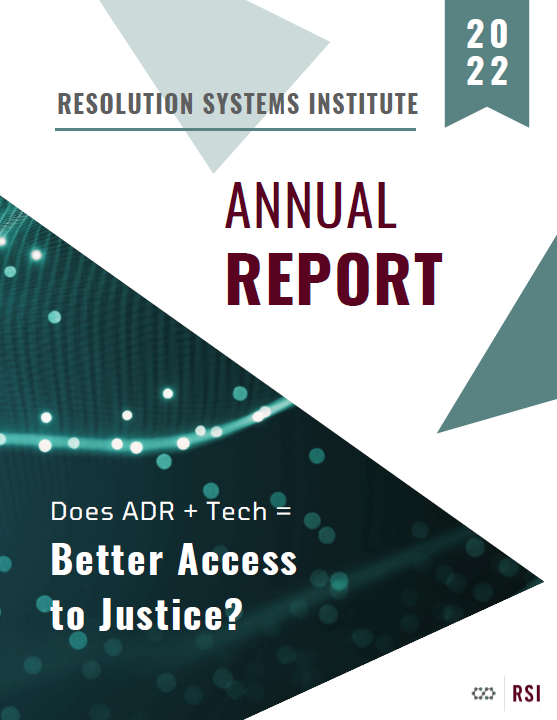A newly published study conducted by RSI Director of Research Jennifer Shack and University of California, Davis, Professor Donna Shestowsky highlights both the potential of online dispute resolution (ODR) and the importance of appropriate outreach and education on ODR to maximize participation and, thus, program impact.
Jen and Donna evaluated a pilot program in Collin County, Texas, that used a text-based ODR platform to resolve debt and small claims cases in a single court. By adopting ODR, the court sought to reduce the burden of a growing caseload while providing access to justice through a process that did not require the parties to travel or miss work to resolve their case.
The evaluation produced evidence that ODR can be an effective method of dispute resolution, especially for debt cases. In 73% of cases where both parties used the ODR platform, participants resolved their dispute and avoided trial. The rate is similar to that of cases that had the opportunity to use in-person mediation. Unfortunately, however, the program’s goals were not met, because both sides used ODR in only 24% of cases uploaded to the platform. Findings and recommendations related to these outcomes are discussed later in this summary.
The Pilot Program
The pilot ran from September 2019 through August 2020; thus it was concurrent with the COVID-19 pandemic from March to August 2020. Additionally, because ODR is a rather new practice in this context, some details of the program and the platform’s application were being worked out even as the evaluation took place.
The Modria ODR platform allowed parties to communicate by text one-on-one or with the help of a mediator. Parties were ostensibly required to use the platform before their first hearing. If parties reached agreement, their case was dismissed without a trial. During the 12-month pilot period, 1,874 debt and 274 small claims cases were filed, for a total of 2,148 cases.
When a defendant filed an answer, the civil clerk determined whether the case was eligible for ODR. It was ineligible if one side had multiple parties, if a party was not equipped to use ODR, or (until the second quarter of 2020) if the court did not have email addresses for both parties or their attorneys. If the case was eligible, the clerk uploaded it to the ODR platform, which in turn rejected any cases that contained errors, such as missing information, and sent an error report to the IT department so the errors could be fixed. When email addresses and phone numbers were available, the platform sent an automated email (and after April 2020, also a text) to the parties, instructing them to use ODR. The clerk also set the case for trial and mailed the parties, or their attorneys, a notice of their trial date and informed them they were required to use ODR prior to that date. The notice included a link to the platform.
Once a case was uploaded to ODR, participants had 45 days to negotiate one-on-one via the platform’s chat function. At any time during this window, either side could ask for a mediator. Mediation cost each party $40 and had to be completed within 30 days.
If participants reached agreement on the platform, they were given the opportunity to sign an online agreed judgment form, which was automatically sent to the case management system, and the trial was cancelled. If the participants did not reach agreement, the parties continued to trial unless they otherwise reached agreement before the trial date.
Key Findings
Below are some of Jen and Donna’s main findings and top recommendations from their evaluation. For more details and complete recommendations, read the full report here.
Litigant Use of ODR
- 49% of cases with answers filed were uploaded to ODR. During the pilot period, answers were filed in 698 cases. These 698 cases form the subset that could potentially have been uploaded to ODR. Of these, 341 cases (49%) were eligible and did not contain errors that barred their upload. These were ultimately offered ODR. According to court staff, the most common reason that cases with answers filed were not uploaded to ODR appears to be that the court lacked email addresses for at least one side of the case.
- One party completed at least one activity online in 50% of cases uploaded to ODR. In 170 of 341 cases (50%), at least one case participant performed at least one activity on the ODR platform, such as asserting a claim, uploading a file, or using the chat function to communicate with the other side.
- Both sides completed at least one activity on the ODR platform in about one-fourth of eligible cases. In 81 cases (24%) uploaded to ODR, both sides used the platform. Parties in small claims cases were more likely to use ODR (76%) than parties in debt claim cases (45%).
- Litigants appeared to be unaware of the ODR program. Litigant survey responses suggested that parties were generally not aware of the ODR program, despite participation being required. Only one survey respondent out of ten indicated having received information about the program. When asked what would make them more likely to use ODR for a similar case in the future, half said more information.
- Litigants had limited access to information about the ODR program. According to court staff, the only ways litigants received information from the court about the ODR program was through the notice the court mailed to them (or their lawyers) about their court date and through an email or text from the platform when the court uploaded their case, if their side had an email address or cellphone number on file with the court. Both of these events occurred only after the defendant filed an answer.
- Litigants appear open to online options. Among survey respondents, none of whom had participated in ODR, two out of three indicated that the option to use it in future similar cases was attractive. Similarly, when asked to consider using video mediation to resolve future similar cases, 60% responded favorably.
Outcomes and Time to Disposition
- 73% of cases in which both parties used ODR resolved before trial. The percentage of ODR cases that resolved before trial was similar to that of cases that did not use ODR, both before and during the ODR program.
- Debt claim cases were significantly more likely than small claims cases to resolve before trial. Additionally, debt claim cases in which defendants were represented were significantly more likely to resolve before trial than debt claim cases in which defendants were unrepresented.
- Time to resolution was, on average, 4.6 months for cases that used ODR. This figure includes cases delayed either because of the court’s closure amid the COVID-19 pandemic or because of an upload error on a court server.
Program Costs
It is important to note that workload and cost conclusions are derived from self-reports made during interviews and are inherently subjective.
- Direct costs to the court to implement ODR were covered by a filing fee. Litigants covered the costs through an extra $5 filing fee the court instituted for all civil cases filed in Collin County except eviction and mental health cases.
- There were significant indirect costs to the court. Court personnel indicated that they devoted a significant amount of time to ODR prior to its launch. The project manager estimated that the cost in staff time approached six figures and was largely due, in his opinion, to the numerous meetings that involved many court personnel as well as the high percentage of time that he and the responsible IT staff member spent on the project in this phase. Some of this effort laid the groundwork for an anticipated county-wide rollout of ODR.
- Costs to administer ODR were minimal. After the program’s launch, the time that personnel spent on ODR appeared to drop considerably. No one interviewed reported spending more than a couple of hours per week on the project.
- ODR did not appreciably change administrative workload. The court administrator and the civil clerk did not perceive an appreciable increase or decrease in their workload. However, it is hard to determine what their workload may have been in the absence of the COVID-19 pandemic, or how much it would have been had greater effort been expended on promoting litigants’ awareness of the program and otherwise attempting to increase ODR use.
Recommendations
Based on the findings of this evaluation, the following recommendations may be relevant for any court considering implementing ODR:
- Expect to spend significant time and resources to get the program up and running.
- Notify parties and lawyers about the ODR program early in the process.
- Educate litigants and lawyers more fully about the program.
- Conduct outreach to raise awareness of, and promote interest in, the ODR program.
- Explore video mediation as a dispute resolution option.




